| VISIT THE REST OF OUR SITE BY CLICKING THESE LINKS | |||||
| SUBSCRIBE | FCF SHOP | HOME | PICTURES | VIDEOS | FCF TV SHOW |
|
Photos and report by Marcelo Alonso Translation by Luiz Eduardo Vianna Originally printed in the July 2001 issue of FCF 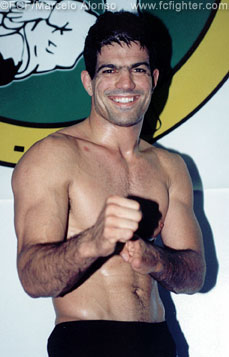 If Jean Jaques Machado had chosen soccer as a vocation, as millions of Brazilians do, the fact that he was born without the fingers of his left hand wouldn't have held much importance. But destiny selected a different path for he and his four brothers, Roger, Rigan, Jony and Carlos, they grew up with their cousins Carlinhos, Crolin and Rillion Gracie, choosing Jiu-Jitsu as their livelihood.
If Jean Jaques Machado had chosen soccer as a vocation, as millions of Brazilians do, the fact that he was born without the fingers of his left hand wouldn't have held much importance. But destiny selected a different path for he and his four brothers, Roger, Rigan, Jony and Carlos, they grew up with their cousins Carlinhos, Crolin and Rillion Gracie, choosing Jiu-Jitsu as their livelihood.Time passed and Jean Jaques overcame his lack of fingers with a heavenly gift. Creating positions to adapt Jiu-Jitsu to his problem, Jean came to be considered one of the most technical and complete Jiu-Jitsu fighters of all time. World recognition came after the third edition of the Abu Dhabi Combat Club World Submission Wrestling Championships, when the Brazilian pulled out an incredible 9 submissions in 14 fights, a record in the history of the event. After the last ADCC tournament, we had the pleasure to talk with this man that is an example of technique, perseverance and obstinacy. How are you related to the Gracie family? My mother is the sister of Lair, the mother of Carlinhos, Crolin and Rillion. When I was a kid I lived in Teresópolis with Jony and trained with Crolin, while my older brothers Rigan and Carlos lived with Carlinhos, who at the time had an academy with Carlson. On my vacations I used to go to Rio and stay there three months training with Carlinhos. He's the one who promoted me. You and your brothers grew up with the Gracies. How can you explain the difference of personalities between you? We were definitely influenced by the Gracie family, but I think that my father's influence worked as a balance, and that differentiated our relationship with other people. How did your move to the United States come about? 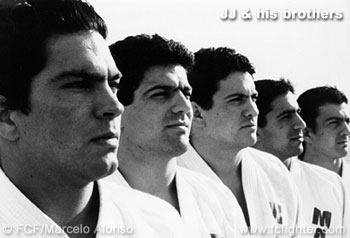 Renzo had a fight in a nightclub in Brazil, where he beat the son of a Federal Police officer. The kid went home and said he was beat by more than one guy--a big lie--and the only person that he knew the name was "that Gracie guy." Because of that, Renzo spent 6 months in our cousin Cezar's house and when [Renzo] came back, he brought [Cezar to Brazil]. So Cezar was accommodated in our house [in Brazil]. When [Cezar] went back to the U.S., he took my brother Rigan with him. At the same time, Rorion was teaching Jiu-Jitsu in his garage and called Rigan to help him. Two years later Rigan called my brother Carlos, who decided to go there with my younger brother Jony. There was a problem there that I prefer not to talk about, and then Rigan and Carlos decided to go back, but some students liked them so much that they decided to buy mats for their garages to start to learn. Then Roger and I went there too.
Renzo had a fight in a nightclub in Brazil, where he beat the son of a Federal Police officer. The kid went home and said he was beat by more than one guy--a big lie--and the only person that he knew the name was "that Gracie guy." Because of that, Renzo spent 6 months in our cousin Cezar's house and when [Renzo] came back, he brought [Cezar to Brazil]. So Cezar was accommodated in our house [in Brazil]. When [Cezar] went back to the U.S., he took my brother Rigan with him. At the same time, Rorion was teaching Jiu-Jitsu in his garage and called Rigan to help him. Two years later Rigan called my brother Carlos, who decided to go there with my younger brother Jony. There was a problem there that I prefer not to talk about, and then Rigan and Carlos decided to go back, but some students liked them so much that they decided to buy mats for their garages to start to learn. Then Roger and I went there too.How did you become friends with Chuck Norris? He came to Brazil on vacations and went to Reylson's academy. Since nobody could answer him [they didn't speak English], he went to Helio's academy and after giving him a class, he gave him Rorion's phone number, [and Rorion] started to teach him. Later they had a financial problem and he decided that he would not train Jiu-Jitsu anymore. Two years later, an Australian actor brought Chuck to train with us. He had a class with my brother Carlos and liked it so much that since 1991 he never stopped. Before, he used to drive 30 minutes to train with us, but now he built an academy for us beside his house, so now we are the ones driving 30 minutes to teach him. How many movies did you participate in with him? Chuck Norris starred in Texas Ranger for 7 years, and we took part in 20 episodes. And in one of them we took part using our real names, which was excellent for us. Chuck was the one who introduced the Machado brothers to the United States. We also made the choreographies of the fights in some of Steven Seagal's movies; he is also our student. Is it true that you starred in a movie? It's true. Living in Los Angeles, everything is cinema. One day some guy came to our academy and invited me and my brothers to star in a movie called '"Bad Boys from Brazil." It's the story of the Rocha brothers, four guys that came from an inland town of Brazil to try to live in America and end getting in a lot of troubles. The movie is done, and is already coming on video. How many academies and students do you have today? We have a lot of academies; each one is run by one [or two] of us. Our first one is located at Torrance [Rigan and Roger] and has 200 students nowadays. The second one is in Redondo Beach [Rigan], which also has approximately 150 students. We opened the third one in Texas [Carlos] that also has 150 students. Then we opened another one, in Pasadena [Carlos], that has 60 students and we also have mine in Tarzana, which has 200 students. Now we just opened another one in Los Angeles, which is going to be taken care of by Jony. Nowadays we have one of the biggest competition teams in the United States, in the last big tournaments held here, our team always gets the first place. What about your famous fight with Wallid? At that time, the scoring system was completely different from what it is today. I remember that Wallid had been winning everything at brown belt. Some people even told me not to fight him because I had just gotten the black belt and at that time, since there were just a few black belts, they decided to mix with the brown belts. The tournament [Copa Atlântico Sul] was held in the court of a condominium called Atlântico Sul, in Barra da Tijuca, Rio de Janeiro. I defeated your namesake, Marcelo Alonso, in the first fight and fought Wallid in the final. As soon as the fight started Wallid tried to apply a kataguruma [shoulder wheel throw], I defended and got him in a crucifix, he fell over backwards and I went to an arm-bar, he resisted and escaped, and then started to try to pass my guard while I was always looking for submissions, with triangle chokes and arm-bars. In the last minute he almost passed my guard, I turtled up and the fight ended with a 0-0 on the score, and the referee gave me the win. It was a war. Was that your best tournament? No, my best performance in tournaments was definitely in the Copa Company. I won my weight class and the absolute in purple belt. I fought 11 times and submitted 9 opponents. 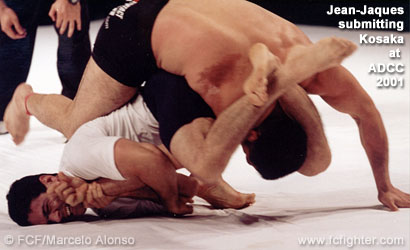 Who were the old school black belts from Barra Gracie that used to train with you? At that time we gave classes at a house, the first Barra Gracie, when Rigan, Carlos and Zé Beleza were partners. Then the landlord asked for the house back and we went to the Espaço Vital academy, which is still the "headquarters" of Barra Gracie. Several of my students from that time are now black belts like Soca, Gordo, Big Head, Gordinho, Sapão, Rommel, Bruno Severiano and Sonequinha. I'm sure I've forgotten somebody. Did you have problems with challengers in the United States? Sure. When the Gracie Academy announced the challenge betting $10,000 for anyone who could beat them, a lot of people came to our academy too. There were wrestlers, kickboxers, karate guys…we didn't have this challenge thing, but since they went there to test us, we used to do it. I also had several problems at seminars. There were always two or three guys trying to test us. One day I was giving a seminar in San Francisco with my brother Carlinhos, and a big football player started to say that those positions didn't work with him. I had to stop the seminar and start a fight with him standing up. He went for a double leg and I got him in a guillotine choke. He asked to do it again and only stopped after tapping out to an arm-bar. After that, he became our student. This happened all the time. Until we built our name, a lot of people slept [went unconscious] or had their arm popped. Now it doesn't happen anymore. Just a few Jiu-Jitsu fighters can do what you do with the gi. What makes you different? I think I have a blessing from God. After years of training I believe that my Jiu-Jitsu started to be touch sensitive. Today I believe that 90% of the movements I make are automatic. I always fought for the submission, ever since blue belt. In fact, my game with or without the gi is almost the same because I don't have the fingers on my left hand, and because of that I always held making hooks. I don't use much grip, even with the right hand. I think that made it easier for me in the no-gi game because I didn't feel much difference. I believe that the fact of not having much strength in the left hand made me create some levers. I hook an arm using the leg and keep doing my game. What's the origin of this problem? It's called Amniotic Band Syndrome. The doctor said this thing happens once in a million. It's brought about by a little grain that leaves the placenta and stays floating in the amniotic fluid; where it lands, the fetus stops growing. That's why I say I was lucky, because if the grain had hit my knee, I wouldn't have a leg. How did you face this problem when you started training? When I started training I didn't think about my hand. Since I grew up in a family with four brothers, the jokes at home prepared me for the streets. When somebody said something, I didn't care. Besides, my brothers always encouraged me and I always loved to compete; I never used my hand as an excuse. It was the opposite, it was a challenge to go there and get the job done. Jiu-Jitsu gave me nothing but help in that case. People say your hand is an advantage when choking without the gi. Is that true? I believe that the fact of not having fingers makes it easier to choke from the mount, even to apply the rear naked choke. I think I created some levers to balance with the handicap that I have. You submitted four of the best Japanese fighters, Yuki Nakai, Kaoru Uno, Hayato Sakurai and now Kosaka in the absolute division of ADCC. Didn't this fame of being the "Nightmare of the Japanese" bring you some invitations to fight in Japan? Those wins gave me the security to know that when a Japanese fighter is coming to fight me, he's already worried. And I feel great when I know the opponent is worried about me. Every year after ADCC I receive offers from several events from Japan. We are in a very professional stage now. Nowadays you can't waste an opportunity, financially, to fight in NHB. It's not something that I want to do, but sometimes the financial pressure conducts you to this side. In my mind, you have to make your own purse. If the promoter thinks you are asking too much, that's fine. I don't need to do it, but if you want me to do it, you'll have to pay what I want. You had your debut in NHB facing a very experienced opponent. Don't you think that Frank Trigg was a bad choice for a debut fight? Actually, I was signed to fight Sakurai. Two weeks prior to the event they told me I was to fight a Brazilian, Marcelo Aguiar. Then they changed to Carlos Newton and a week before the event they changed to Frank Trigg. I had actually never heard of him, so I watched some of his tapes and was told that he was undefeated. Later I was told that Sakurai didn't want to fight me. At that time I accepted the fight not because of the money, but for myself, I wanted to have the experience of an NHB fight. I did 100% Jiu-Jitsu, didn't throw a single punch. In the first round he came at me and I almost caught him a few times. The second round started at an incredible pace... That was when you almost submitted him with a crucifix... That was my mistake. I should have punched his head. When the second round was over I heard him telling his corner that he didn't want to get back because he was very tired. During the break I told my brother that I was going to get the clinch early in the fight, and that I thought that he was going to quit. In the beginning of the third round, when I went for the double-leg, he gave me a side kick and, since my head was down, it hit me right in the forehead and I went down with him in my guard, then I saw the blood and I thought it was his. That was when the ref stopped the bout and I realized that the blood was mine. Judging by the strength of the kick, it should have been a knock out, but I didn't feel anything. In a debut I think that I really fought a tough guy. How do you see the growth of submission fighting in the United States? I'm promoting tournaments there every two months and I feel I must [arrange the tournaments so that it's] one day with the gi, and one day with Abu Dhabi rules. In the latest competitions, I'm having an average of 400 athletes, more in the Abu Dhabi rules than in Jiu-Jitsu…because with the ADCC rules, you are giving opportunities to wrestlers, sambo and judo fighters to have a better chance to win against Jiu-Jitsu fighters because they are not wearing the gi. There are a lot of academies in the U.S. teaching submission grappling. Actually, all those names are nothing more than Brazilian Jiu-Jitsu. Do you feel they are trying to recreate Jiu-Jitsu in America? Sure. There are a lot of fighting styles nowadays that are changing the name of the Brazilian Jiu-Jitsu. They have Karate Grappling, Submission Grappling...At first, some people got worried when the Brazilians showed up, and some of them even said that Jiu-Jitsu wasn't anything new and that they already trained grappling over the last 15 years. The curious thing is that nobody showed up in magazines or to fight in the UFC to show their arts. Now there are still people who hate BJJ, but have to respect it. The athlete may keep training in his martial art, but will also train Jiu-Jitsu. Now I have some students that are kickboxers, wrestlers and judo fighters, but none of them are professionals. The Machados have been having problems with the Jiu-Jitsu community because some students, like Egan and Enson Inoue and Ricco Rodriguez, became potential opponents for the Jiu-Jitsu fighters. What do you think about this situation? My academy is like my house, when a student gets there we have to know him well before he gets really welcome. As the time passes, the student becomes part of the family, but that doesn't mean that you won't get disappointed with him. Many times those students become professionals and want to go to NHB. Egan, for example, was always a nice guy that still could have been with us, but unfortunately some Brazilians didn't like when he became the first foreign fighter to be a World Champion. So then in the Pan-American in Hawaii, he got involved in a commotion [with Relson Gracie in Feb. 1998]. Knowing about our relationship with the Gracie family, he called us and said he didn't want us to have any problem because of them, and decided to leave our academy. Now Enson and Egan are members of Nova União. Ricco's case was similar. He started training with us when he was 22 years old and weighed 130kg [286lbs], a great person that we always treat like a son. He trained with us for four years, started to excel and got in a place that he wanted to be on the top. Since there is no one at his size to train NHB with him in our academy, he started training with Kerr. One day he called us from Japan, saying that he had received as excellent offer to train at Takada Dojo, asking what we thought about it, like saying "if you say no, I won't go." We had to accept it and he's taking care of his professional career. Now he still is our friend but fights for another academy. Is it true that Kerr trained with you prior to his fight against Zé Mario? There was a rumor about that. Actually, the guy went to our academy twice. He trained one day on his feet and the other day on the ground with Rigan. I heard about it on the Internet, so I called my brother and told him to let me know when he goes there because I'd want to go there to roll with him to see how it is. To check if he's really the superman that everybody says and test our Jiu-Jitsu. He's a very polite and nice guy, but he's not training with us. What's the importance of cross training in your opinion? When Royce fought and beat several opponents in the UFC, a lot of people in Brazil didn't get convinced, but in the U.S., my academy was filled with students. In fact, it was impossible to have less than 100 students if you were teaching Jiu-Jitsu in the U.S. during the time of the first UFC. Thanks to this worldwide recognition, now the Jiu-Jitsu is not a Brazilian exclusivity. Everybody trains it, some do it more than others, but that's enough to end the surprise thing that happened years ago. I think a fighter should never leave his roots. I believe the Jiu-Jitsu will keep winning, but it has to become more complete. Nowadays the Jiu-Jitsu alone doesn't win. Also, you can't give weight advantage anymore. 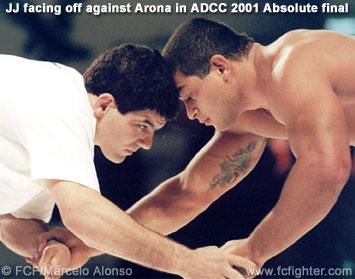 You had an excellent fight with Ricardo Arona in the final of the ADCC Absolute Division. What did you think of him? Arona is showing up as the greatest prospect of the new generation. He won his weight class last year and now won in his weight and in the Absolute. In our fight at the final I did my usual game, I don't know how to play for points, my goal is to always try for the submission. I did two good attacks, one on his foot and the other one in an omoplata but he defended very well, showing that he's not just strong but also technical, one of the bests of today's competition. Although I didn't win, I think it was a good fight for me. I think everybody liked it. What are Arona's chances against Kerr? They have a similar game, they even have similar bodies and also the way they fight on their feet. Both have great takedowns. Kerr is a world-class wrestler, but Arona surprised several wrestlers at their own game, why can't he surprise Kerr too? He has a year to train and win in which game he decides to do. How did you face your loss to Cabelinho at the Mundial of 1999? That loss was a big lesson for me. I learned that you should never underestimate your opponent. Before that fight I had two quick submission wins and in my mind I was going to submit everybody. Obviously, it didn't happen. Actually, I went into the fight with Cabelinho already thinking about the next fight against Alexandre Paiva. He surprised me and I underestimated him. It was a lesson. That was the first submission loss in my life and I'll redeem myself. The day that I think about retiring, I don't want to retire with that loss [unavenged]. 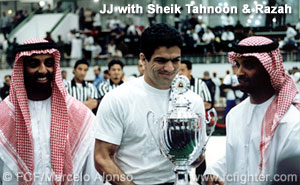 At 33 years old, do you think about retiring?
At 33 years old, do you think about retiring?I feel better now than when I was 23. I love to compete; it's in my blood. I believe that the athlete gets to a level that he just has to compete against himself. The competitions teach you to be a better human being, no matter what's the result. I still have like 10 more years ahead of me. You'll still have to put up with me for a long time. |
| © All materials contained in the Full Contact Fighter web site are protected by copyright and to be used only for personal and noncommercial uses. Public display or copying for sale or public distribution of any of these materials is strictly prohibited. |